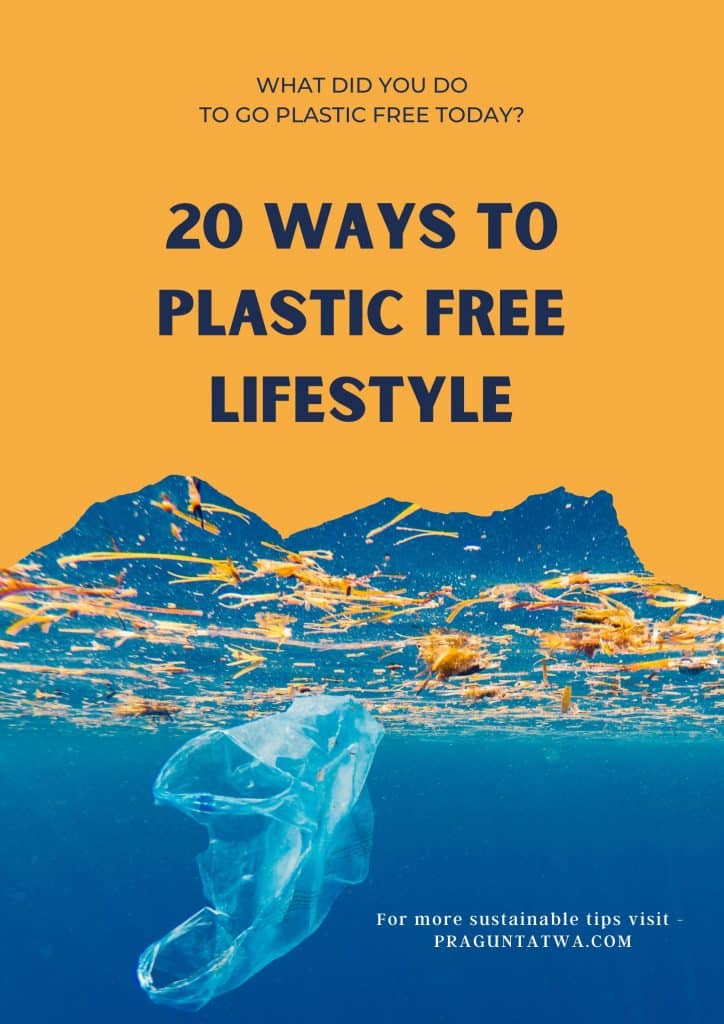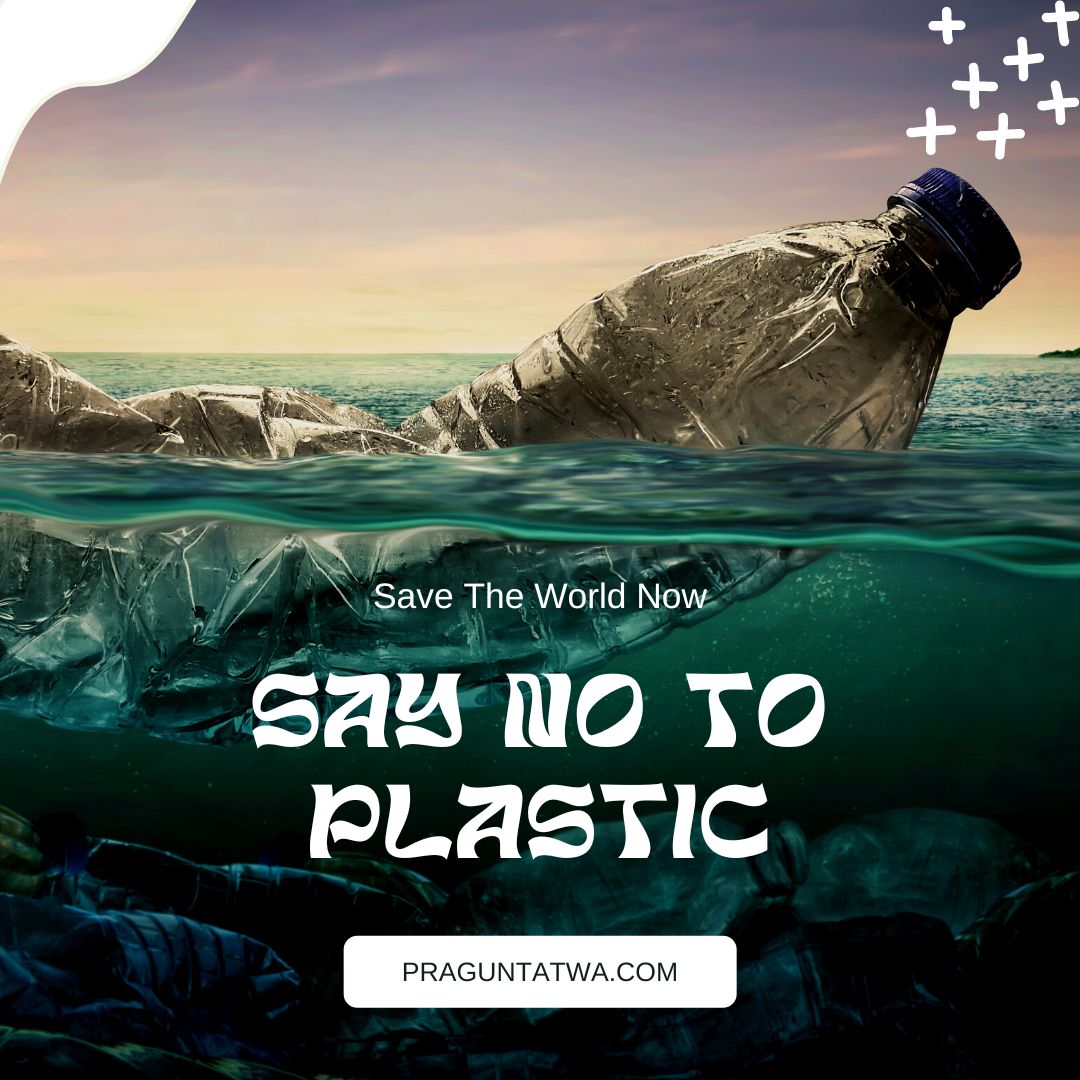We humans have become so dependent on plastics for a range of uses, from packaging to products. Reducing our use of plastic bags is an easy place to start getting our addiction out of control.
~ David Suzuki.
A plastic-free lifestyle refers to making conscious choices to reduce or eliminate the use of single-use plastic products in daily life. It involves adopting alternative and more sustainable practices that minimize plastic waste and promote environmental well-being. Reducing plastic usage is crucial for the environment, as plastic pollution has become a significant global issue. Here are some steps you can take to embrace a plastic-free lifestyle:
- Educate Yourself: Learn about the impact of plastic pollution on the environment and the benefits of reducing plastic usage. Understanding the problem is the first step toward making positive changes.
- Identify Single-Use Plastics: Recognize the single-use plastic items in your daily life, such as plastic bags, straws, cutlery, water bottles, and food packaging. Focus on eliminating or replacing them.
- Reusable Alternatives: Invest in reusable alternatives, like cloth bags, stainless steel or glass water bottles, and reusable food containers. These can significantly reduce your reliance on disposable plastic items.
- BYOB Bring your own bag: Always carry a reusable shopping bag with you when you go out to avoid using plastic bags provided by stores.
- Use reusable water bottles: Invest in a durable water bottle and refill it instead of buying single-use plastic bottles. Carry your own bottle instead of buying a single-use plastic bottle. Simply give up plastic bottled water or beverages.
- Say No to Plastic Straws: Refuse plastic straws at restaurants and bars. If you prefer using straws, consider carrying a reusable one made from stainless steel, bamboo, or glass. Refuse to take the plastic straw or opt for reusable or biodegradable alternatives such as metal, glass, or bamboo straws whenever you buy a beverage.
- Bring your own reusable cutlery: Carry a set of reusable cutlery (fork, spoon, and knife) so you can avoid using disposable plastic cutlery when eating out. Plastic cutlery such as spoons and knives and straws are among the worst pollutants. Carry cutlery with you from home and keep it in the bag or car. It could be made of stainless steel, wood, or anything that is not plastic or disposable in order to keep this world plastic-free.
-
Use stainless steel bottles and cups for water or coffee as you move around
- Reduce Packaging: Buy products with minimal or no plastic packaging. Opt for items packed in paper, glass, or other eco-friendly materials. Avoid plastic packaging and choose products with minimal or no plastic packaging whenever possible. Look for alternatives such as bulk bins, farmers’ markets, or stores that offer unpackaged options.
-
Use reusable containers for take-outs and leftovers: Next time you are out for food and you need to take out foods or leftovers use one of your containers instead of the takeout containers provided. Make sure you carry with you a container each time you go out to avoid promoting the use of plastic materials. The move will allow movement towards a plastic-free living.
- Pack a lunchbox: Use a reusable lunchbox or container for packing your meals instead of disposable plastic bags or containers.
- Bulk Shopping: Purchase items in bulk whenever possible, as it reduces the need for excessive packaging. It is important to shop in bulk be it for personal effects, groceries, hardware products, cleaning supplies, or other products that come in plastic packages. When you shop in bulk, you avoid using plastic packaging or minimize them.
- Avoid Microbeads: Check personal care products for microbeads, which are tiny plastic particles harmful to the environment. Choose products with natural exfoliants instead.
- Make your own cleaning products: Make your cleaning products, Create homemade cleaning solutions DIY, using simple natural ingredients like vinegar, baking soda, and essential oils. This minimizes the use of plastic-packaged cleaning products, plastic containers, and harmful chemicals.
- Choose Eco-Friendly Brands: Support brands and companies that prioritize sustainable and plastic-free packaging. A better option choose seasonal and local products and producers.
- Recycling and Disposal: Properly dispose of and recycle plastic waste to prevent it from ending up in the environment.
- Choose natural fibers: Opt for clothing made from natural fibers like cotton, linen, or hemp instead of synthetic materials like polyester, which shed microplastics when washed.
- Compost organic waste: Instead of using plastic trash bags, consider composting your food scraps and yard waste. Composting helps reduce the amount of waste sent to landfills.
-
Get Rid of Plastic Trash Bags: Instead of using plastic garbage bags for trash, you could get a recycled plastic Urban Compost Tumbler which allows you to decompose garbage instead of throwing it away. Therefore, the use of plastic bags becomes obsolete.
- Spread Awareness: Educate and Encourage friends, family, colleagues, and community about the benefits of a plastic-free lifestyle and encourage them to join you in making sustainable choices. The more people who adopt plastic-free practices, the greater the positive impact on the environment.
Remember, transitioning to a plastic-free lifestyle doesn’t happen overnight. It is a gradual process, so don’t be too hard on yourself if you encounter challenges along the way. It’s about making small, sustainable changes over time. Celebrate your progress and be open to continuously learning and improving your practices. Every small step you take to reduce plastic waste makes a positive impact on the environment, toward a healthier planet.

From My Green Bag
To sum up, This is my conscious lifestyle post to spread more awareness about sustainable living and eco-friendly choices. Join me for more such ways and tips and become part of my Conscious and sustainable living journey. Keep visiting my blog to make yourself eco-friendly, aware of conscious and sustainable choices and be more concerned for our environment, and alter your lifestyle.
To add on, read and join Sustainability with Prachi series and listen to interviews with Eco-conscious people who are trying their bit towards conscious and sustainable living practices only on Green Tatwa Talks. There is so much to learn and explore from all of them I had interacted with, do listen and drop in your views in the comments. Check here to know more about all the Eco-Friendly dates.
Keep visiting.
Being Eco-Friendly is not a choice, make it a habit.
Without a doubt, sustainability is easier than you think. You don’t have to jump in by changing everything, start small to make the changes more eco-friendly, sustainable and a part of your daily life.

Leave a Reply